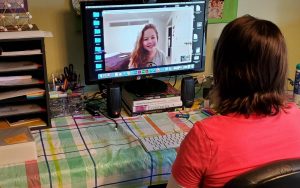UW Oshkosh education students provide K-12 tutoring
April 16, 2020
About 89 teacher candidates studying at UW Oshkosh are partnered with 190 K-12 students from across the country to help support their learning during the COVID-19 pandemic.
The program was initiated after St. Norbert College associate professor Bola Delano-Oriaran identified a need for her teacher candidates to continue collecting their clinical hours outside of the traditional classroom, as well as a need to support K-12 students who may be struggling to adjust to the new online format. She reached out to UW Oshkosh and other universities for a partnership.

As the need for tutors grew, the program expanded to seven institutions, with more than 250 tutors lending a hand. Requests for tutoring have been made by more than 600 families from across the United States.
The professors overseeing the program are making a considerable effort to partner the right K-12 students with the teacher candidate who has the most in-line qualifications. UWO professor Marguerite Penick-Parks is one of them.
“The teacher candidates were paired with students based on the areas in which they are seeking teacher certification,” Penrick-Parks said. “For example, a teacher candidate seeking elementary level certification has been paired with elementary grade students and secondary English teacher candidates have been paired with middle and high school students who needed support in their reading/literacy/English classes.”
Bree Lamers, a senior elementary education student set to student teach in the fall, says that online tutoring has been a difficult but necessary transition.
“The most difficult aspect was going into tutoring without any information about where these students stand academically,” Lamers said. “It was essential that during the first tutoring sessions to talk with the parents and students about their strengths, needs and goals for our following tutoring sessions.”
Due to her UW Oshkosh education, Lamers said she feels equipped to navigate this uncertain and new style of teaching, and has been given assistance from her professors.
“I have been fortunate enough to have professors who have given tutors lists of educational websites that may be used to assist in tutoring,” Lamers said.
Lamers is tutoring two students, one located in Wisconsin and the other in New Jersey. She is teaching both students math, a troubling subject for many children. She says the students are adjusting differently based on instruction from their respective schools.
“One of my students who was provided daily instruction seems to be adjusting very well and is keeping up to pace with her assignments from her teacher and the materials that I have provided,” Lamers said. “My second student with little daily instruction seems to be struggling a bit more academically and would rather do things other than school work.”
One thing is for sure: Lamers recognizes that this transition is tough for everyone, even herself. She practices positivity with her students.
“I have been doing my best to celebrate student success and make sure that their hard work does not go unnoticed,” Lamers said.
Penick-Parks foresees the program lasting beyond the school year, as it will continue to be valuable for both the K-12 students and their tutors.
“We are currently looking at ways to expand the program into summer. Because of the current school conditions, there is going to be a need to keep K-12 students engaged in learning all summer,” Penick-Parks said. “Tutoring is an excellent way for teacher candidates to continue and engage in working on their instructional and pedagogical skills.”













